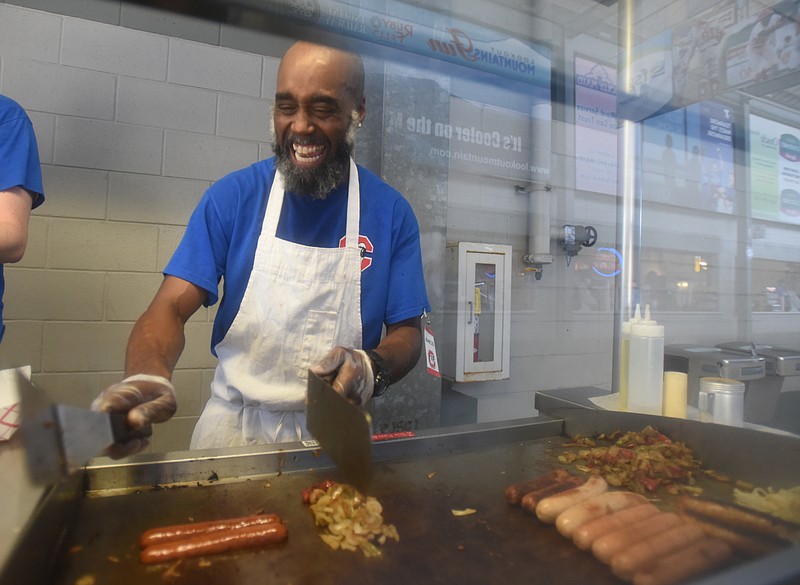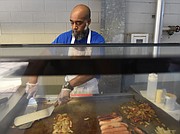With the budget I have and offering the program free, I put the focus on giving my students marketable skills that would get them hired and in the door."
Marcus Sales works as a chef in two jobs, the first at AT&T Field's giant grill, cooking up hot dogs and hamburgers for Chattanooga Lookouts games. His second job begins about 2 a.m. - often the same night as Lookout games - at a sports bar where two dancing girls sometimes entertain customers.
At the bar - which he does not want named although it's not a strip club - he may easily spend the whole night working on dishes like Chicken Alfredo and complex salads, expanding the menu far beyond the usual fried bar snacks.
"I got two compliments at the bar that made me feel great; one customer told me that the food I made was better than Hooter's," Sales says with warm, happy, irresistible laughter. "And the girls told me one day, 'Marcus, you're saving lives by making dishes that are healthy to eat.'
"It means a lot to me that they enjoy my food, the food that I am busy making in the kitchen while they are dancing."
As Chattanooga morphs into a foodie destination, there is a growing demand for culinary workers. But for people like Sales, the cost of some local schools is beyond their means. The 36-week culinary program at Chattanooga's Virginia College costs $15,991 to earn a diploma. Chattanooga State Community College has a two-year culinary arts program that requires 60 credit hours, or about $8,800 for a Tennessee resident.
So, to hone his cooking skills, Sales turned to the Salvation Army, which launched a culinary school in March 2010. It was created by Chef Terry Epps, a graduate of the prestigious Le Cordon Bleu College of Culinary Arts Atlanta. He could be earning more money in a posh restaurant, but he chose to develop the Salvation Army's 12-week program, which is offered absolutely free to indigent, sometimes-homeless students.
Epps say his wife had some choice words when he decided to take the Salvation Army job immediately after graduating from Cordon Bleu, but it was a rare chance to create a culinary program from scratch and do something meaningful. While cooking good food is satisfying, he says, it doesn't change people's lives.
All his students are required to be drug-free and determined to learn. Each must write an essay on a five-year plan for his or her future as part of the application process. The essay helps Epps decide whether they understand reality and take some responsibility for making their lives better. They also have to be constantly aware of cleanliness.
"All 37 of our graduates have landed jobs in restaurants - Olive Garden, Honest Pint, Waffle House - and assisted living facilities and caterers," Epps says. "The one exception was a student who was diagnosed with epilepsy and forbidden to drive. She was unable to take a job offered to her because her illness became quite serious."
Epps can afford to get three students - there are normally 15 to 20 applicants for the class - through the intensive program. Since 2010, only one student has been unable to graduate successfully and he left to reunite with his family in another state in a new and stable atmosphere.
Epps' classes are held in the Salvation Army center on McCallie Street downtown. It has showers that students can use if they need to clean up since some come directly from construction work or loading docks. Dressed in crisp white uniforms for the classes, when the students graduate, they are "hatted," given tall chef hats and handed their certificates.
"I can see the difference in their posture, their demeanor when they put on the uniforms," Epps says. "They feel the dignity of being professionals and being treated that way."
He tries to stay in touch with all his alumni, and most come back at Thanksgiving to volunteer to cook for and feed an average of 800 homeless or impoverished people. Many even stay late to help deliver meals to shut-ins.
For the classes, each student is given a first-rate knife set and a garden plot outside the center in which to grow fresh veggies and fruit. Ace Hardware donated seeds and the raised garden beds, which Ace volunteers built. Sales remembers learning how to grow lettuce, zucchini, onions, bell peppers, parsley, rosemary, tomatoes, potatoes, watermelon and carrots.
"With the budget I have and offering the program free, I put the focus on giving my students marketable skills that would get them hired and in the door," he says. "For example, many chefs here want to offer customers farm-to-fork ingredients so my students learn to cultivate a small kitchen garden and grow their own vegetables."
It costs the Salvation Army $2,400 to give each student training, uniforms and the knife set, Epps says. To help offset the costs, TerraMae Appalachian Bistro Chef Shelley Cooper held a fundraiser a few weeks ago called the Southside Block Party at the restaurant. The inaugural event raised a bit over $3,000 and the plan is to make the fundraiser an annual event.
TerraMae General Manager L'Erin Chidester explains that Cooper and the restaurant's staff got to know Epps as a TerraMae customer and the more they learned about the program, the more supportive they became.
"The program gives people that otherwise would not have the opportunity to learn a skill set and helps place them with employment," Chidester says. "Terry did tell us that the participants that are chosen are hand selected and really have to want it.
"At this time we do not have anyone from the program working with us, but we are always looking for great chefs and would be open to hiring anyone that has talent and wants to work hard, " Chidester says.
Along with manning the grill at Lookout games and working at the bar, Sales also works a third job at Champs Sports in Hamilton Place so he can pay for ballet lessons and sports team fees for his three daughters.
"One pair of ballet slippers costs $70," Sales sighs. "But my daughter is such a talented dancer, I want her to have what she needs for lessons."
On a recent weekday as he walks through the mall toward Champs, he seems like the unofficial mall mayor. At least a dozen Champs customers and workers at other stores greet him warmly. He still is as fit and energetic as the college athlete he once was and, at Champs, he's adept at matching the right gear to a customer.
"But I worry that in retail, it's an industry where the focus might be on hiring younger staff." he said.
Despite his busy schedule as chef, salesman and dad, Sales manages to find time to volunteer for the Salvation Army's disaster response team. The next time a tornado or flood strikes, he will be manning a Salvation Army food truck so disaster victims and first responders will get a hot meal and one of Sales' warm, spirit-boosting miles.
"I am glad to have the jobs," he says with a sheepish smile. "I just don't want the Salvation Army Culinary School to be embarrassed that one of their graduates works in a place with dancing. After all, I am a married man with three great kids, so Chef Terry doesn't need to worry about me."
No worries there. Epps, is immensely proud of his former student, admiring Sales' determination and hard work. And, yes, Epps knows the bar has dancing girls.
"My students get entry-level jobs when they leave here right away and I believe that some, like Marcus, have the talent to move up the ranks into culinary jobs that pay a good living," he says.
Contact Lynda Edwards at ledwards@timesfreepress.com or 423-757-6391.

